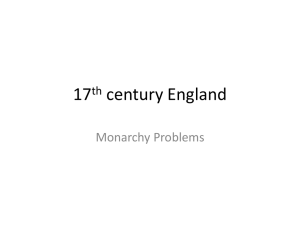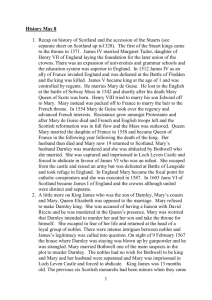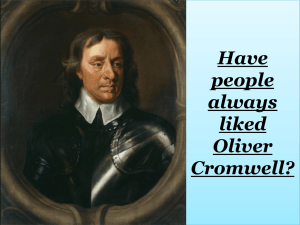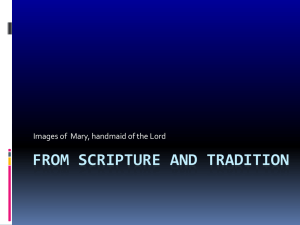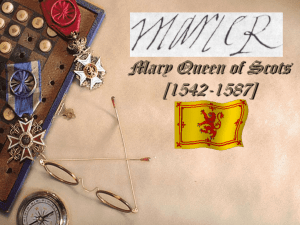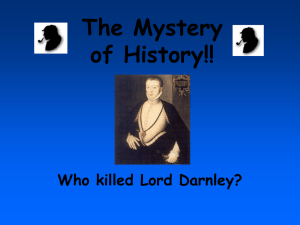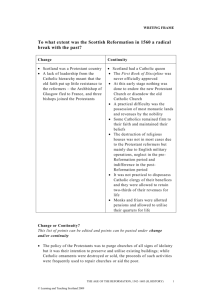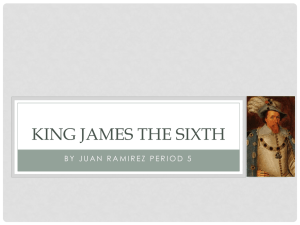The Stuarts - britishstudies
advertisement
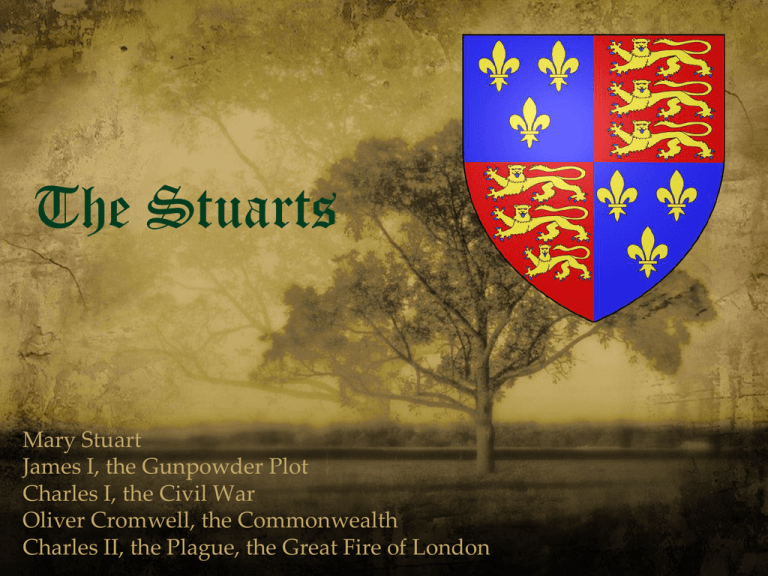
The Stuarts Mary Stuart James I, the Gunpowder Plot Charles I, the Civil War Oliver Cromwell, the Commonwealth Charles II, the Plague, the Great Fire of London Mary Stuart • • • • Queen of Scots from 14 December 1542 to 24 July 1567. Five-year-old Mary was sent to France in 1548. Mary Stuart married Francis at the age of 17. In 1565 she married her first cousin, Lord Darnley. Mary (age 17) and Francis (age 15) Mary Stuart • Darnley murdered Rizzio in front of the pregnant Mary. • Their son, James, was born on 19 June 1566. • 1567 Lord Darnley was murdered. Lord Darnley Mary Stuart • Mary and Bothwell got married at the Palace of Holyroodhouse. • Scottish people made Mary's son, James, the King of Scotland. • Queen of Scots, was executed on February 8, 1587. • Mary loved animals and her little Skye terrier was her only friend in prison. Bothwell James I • James I was King of Scotland and King of England and Ireland • He became king in Scotland from 24 July 1567 • Ruled England, Scotland, and Ireland for 22 years • Used the title King of Great Britain James I • Wanted to establish a permanent Union of the Crowns under one monarch. • Found great difficulty in gaining acceptance as a king. • Came to the throne at the peak of monarchical power. The Gunpowder Plot • Took place in 1605. • The plot intended to kill the king by blowing up the Houses of Parliament. Charles I • He was the King of England, Scotland and Ireland from 27 March 1625 until his execution on 30 January 1649 • He took many actions during his rule that caused widespread opposition • Charles was executed for high treason The English Civil War • The Great Rebellion started in 1641 and ended in 1651. • The Civil War ended at the Battle of Worcester. • The English monarchy was first replaced with the Commonwealth of England and afterwards with a Protectorate. Oliver Cromwell • Born on April 25, 1599 • English military and political leader • Lord Protector of England, Scotland, and Ireland. • Born in to an influential and wealthy family. • Educated at Huntingdon grammar school • Had no significant role in national politics before the Civil War Oliver Cromwell • Created and led a superb force of cavalry, the 'Ironsides‘ • Rose from the rank of captain to lieutenant-general in three years • Was a prime mover in execution of Charles I • Defeated the supporters of the king's son Charles II • Ended the civil war • Refused the offer of the crown. • Died on 3 September 1658 in London The Commonwealth • Was the name given to England when it became a republic. • The country was ruled by a committee of Parliament. • In 1653 Oliver Cromwell dissolved Parliament and ended the Commonwealth. Charles II • • • • Born in 29.05.1630 Crowned in 29.05.1660 Died in 06.02.1685 King of England, Scotland and Ireland • Was known as the Merrie Monarch • Converted to Roman Catholicism on his deathbed The Great Plague of London • 1665 – 1666 • Brought death to ~100,000 people • Stronger than “the Black Death“ • ~40,000 dogs and ~200,000 cats were killed The Great Plague of London The Great Fire of London • Began on the night of 02.09.1666 on Pudding Lane • London was built of wood • 6 people died • ~80% of the city was destroyed: 13,000 houses; 89 churches; 52 Guild Halls • Helped to end the Great Plague The Great Fire of London Thank you. • • • • • Rain Laansalu Kaido Kallas Kätlin Lill Karl Kangur Karl Hendrik Lindmaa

